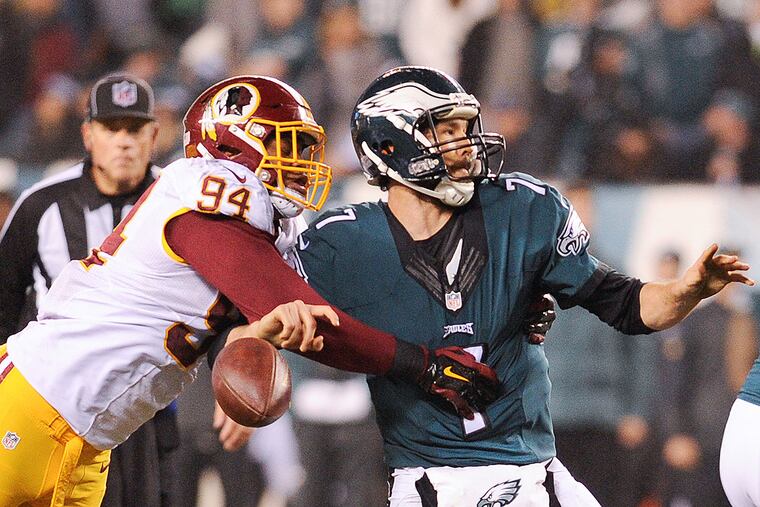Players frustrated by Eagles offensive woes
In Chip Kelly's first NFL game, the Eagles scored 33 points and displayed a system and personnel that helped make them an offensive juggernaut. They scored into the 30s seven more times that season. They also reached 30 nine times in 2014, albeit with the help of non-offensive touchdowns.

In Chip Kelly's first NFL game, the Eagles scored 33 points and displayed a system and personnel that helped make them an offensive juggernaut. They scored into the 30s seven more times that season. They also reached 30 nine times in 2014, albeit with the help of non-offensive touchdowns.
In 15 games this year, it's happened only three times. The regression of the offense has been on display all year, and it was evident in the Eagles' 38-24 loss to the Washington Redskins on Saturday. Turnovers, poor blocking, dropped passes, penalties, and missed opportunities continue to plague the team.
The Eagles have only eight offensive players remaining from 2013. They have only five offensive starters remaining from 2014. The departed players were not the product of the system. The system is the product of the players. Those players have produced 359.7 yards per game and 22.8 points per game this season – both in the middle of the pack instead of near the top, like in the first two years.
"I think we're good enough," Kelly said after Saturday's loss. "I just think we have to put them in position to make plays."
But there's no LeSean McCoy or Jeremy Maclin or DeSean Jackson or Evan Mathis to put in positions. All were sent packing after making Pro Bowls under Kelly. He oversaw an offensive overhaul, and the production of the newcomers has not matched the production of the departed.
The Eagles made a major investment in the running game during the offseason, giving DeMarco Murray a five-year, $40 million contract and Ryan Mathews a three-year, $12 million deal. The offense was supposed to be built around the running game, but the ground game went downhill this season.
The Eagles average 108.2 rushing yards per game, which was No. 15 in the NFL entering Sunday. They were No. 1 in 2013 with 160.4 rushing yards per game in 2013 and No. 9 in 2014 with 124.5 rushing yards per game in 2014. So the changes in the backfield only led to regression – and the construction of the offensive line was a contributing factor.
Saturday, the Eagles' running backs rushed 14 times for 44 yards. Kelly said the Eagles thought they would have a tough time running against some of the big bodies in the middle of Washington's defensive line, but the Redskins entered the game with one of the NFL's worst rushing defenses. The 4.9 yards per carry against Washington's defense was the second highest total in the league. Other teams were able to do what the Eagles couldn't do.
Kelly said the Eagles also thought they could take advantage of Washington's secondary. Quarterback Sam Bradford threw 56 times. There was validity to the plan, too, because Bradford totaled 380 passing yards. That could have been greater if he not for key drops.
Nelson Agholor dropped a 27-yard touchdown. Riley Cooper dropped a 37-yard attempt. The Eagles have 29 dropped passes this season. The five outside wide receivers combine for fewer receiving yards than Jackson recorded in 2013 or Maclin tallied in 2014. Even though inside targets Jordan Matthews and Zach Ertz emerged as productive options, the Eagles do not have the same talent on the outside that helped pace the offense in the past.
"We have a bunch of young guys as far as the receivers," Matthews said. "Most of our core is only two years in, even going down to the free-agent guys we signed. Guys have to grow, guys have to grow up, and that starts with me. I have to be the leader of this offense and the receiver that our team and this city needs. I put a lot of that on my shoulders and I'm going to continue to keep these guys going and keep these guys motivated."
The offensive line takes responsibility for some of the problems with the offense, too. The lackluster running game goes back to poor blocking. Injuries have sapped the group's continuity. Left tackle Jason Peters, who has anchored the line in the past, has been on and off the field this season. Center Jason Kelce has not been as productive as past seasons, and the guards have never been a strength of the unit this year.
"It just [stinks]," center Jason Kelce said. "Offensively, just so many self-inflicted things. You cannot win in this league as an offense if you're doing that and it starts with the offensive line. False starts, bad snaps, those are problems that we've had all season long. Never got it corrected."
The key part of the offense is quarterback. Bradford improved as the season progressed, and he was not the problem in recent weeks. But he was not the solution during the early-season woes, and the Eagles must make a decision about a quarterback who lost 37 of 62 games he's started in the NFL.
The defense's collapse will receive blame when the obituary is written on the Eagles' season, but the offense has been a problem throughout the year. The person responsible for the offense is Kelly. One of the league's best attacks during Kelly's first season is now mediocre – and though Kelly said the coaching must be better, it's the roster he assembled that is failing to execute.
"Obviously, you had the dropped passes, turnovers, never able to really establish a solid running attack for most of the year," Kelce said. "It's really a recipe for disaster. Obviously, very frustrated. This is not what any of us expected or wanted, but in this league, you will get exposed if you're not good enough and you don't play well."
@ZBerm